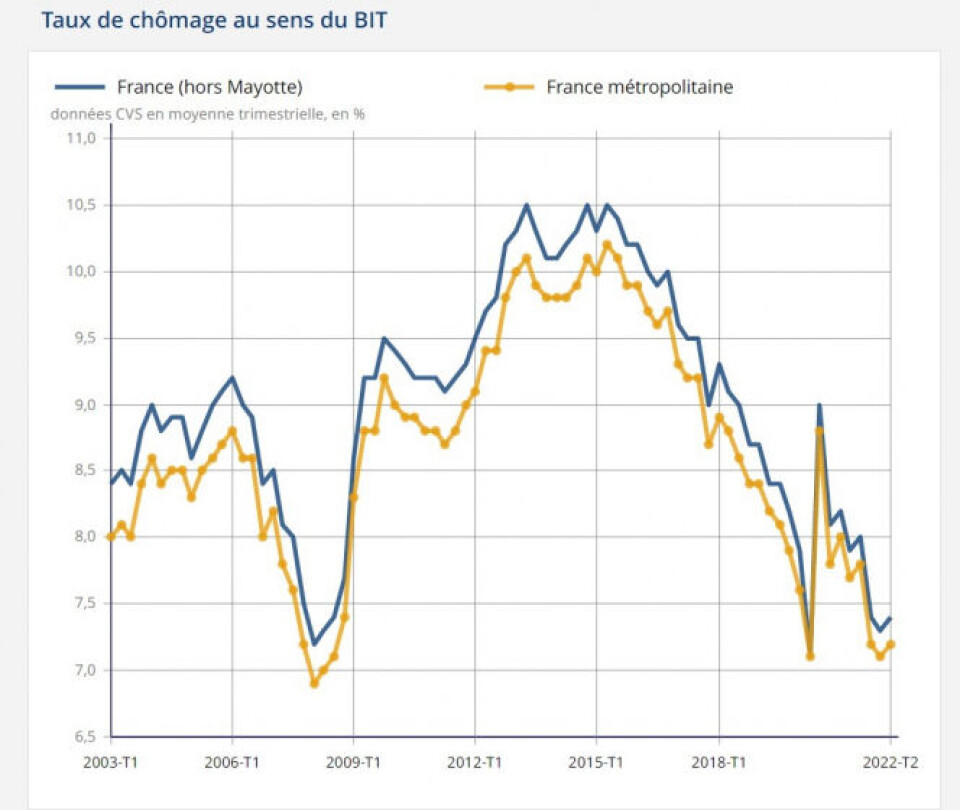-
Dates 2026: Family allowance payments and other French benefits
The payment date varies if it falls on a weekend
-
What are the proposed changes to child allowance rules in France?
Over two million families could see a change to their allocations familiales if measure is approved
-
18 French departments launch service to help elderly with administrative procedures
‘Help desks’ will be set up in public establishments such as town halls and post offices
Labour shortage: France plans to tighten unemployment benefit rules
The government hopes to bring the unemployment rate down to 5% by 2027. It is currently at 7.4%

The French government is looking at reforming the unemployment benefit system for the second time in the space of just a few years to encourage people to get back to work.
Labour minister Olivier Dussopt told BFM Business on Wednesday (September 7) that businesses were struggling to recruit people while the unemployment rate is still too high.
“We have between 300,000 and 400,000 vacant positions open today,” he said.
“We need to encourage a return to work [for the unemployed].
“When things are going well, the rules are tightened and when things are bad, they are “relaxed.”
Olivier Dussopt, ministre du Travail, du Plein emploi et de l’Insertion, est l'invité de la Grande Interview https://t.co/FOWJUp7B94
— BFM Business (@bfmbusiness) September 7, 2022
France’s current unemployment rate is 7.4%, still far from the target of 5% that the government hopes to achieve by 2027.
The graph below shows the evolution of France’s unemployment rate since 2003.

Credit: Insee
There are around 6.5 million people in France registered with the Pôle emploi (unemployment office) but only around 2.6 million of them receive benefits, the latest figures from Unédic, the association managing unemployment benefits in France, show.
What reforms are planned?
The last reform to unemployment benefits meant that since October 1, 2021, the eligibility criteria for people claiming benefits has changed.
It used to be that the salaire journalier de référence (SJR) – which serves as the basis for unemployment benefits – was calculated by dividing the amount a person earned by the number of days that the person worked over a certain period of time.
That was updated in 2021 so that all days, those that people work and do not work, are taken into account over a period of the previous 24 months before unemployment.
This essentially made it more difficult to access benefits for certain people who were in and out of employment regularly.
The government wants to extend this measure, which was set to end in October this year, to the end of 2023.
Elsewhere, the government is also looking at modifying the number of days a person must have worked to claim benefits.
Currently, it is necessary to have worked six months out of 24 to claim benefits. The government is considering changing this to either seven or eight months, or lowering the 24-month period to 17 or 18.
There are no plans to lower the amount of benefits that people receive.
The average person receiving unemployment benefits gets around €960 per month. This is broken down into €1,070 for those who are fully unemployed, or €720 for those who work to supplement their income.
The government intends to hold discussions with French trade unions about potential reforms.
It will also debate the new draft law with MPs in October with the aim of having it in place by January 2023.
Towards a Canadian system?
Several reputed French media outlets report that France is considering following a model with similarities to that used in Canada, where the economic situation of the place of residence determines the amount of aid and its duration.
However, how this would fit with the pledge in France that there will be no changes to the amount of benefits that people in France receive is unclear.
Related articles
Inflation, climate, pensions: a tough ‘rentrée’ for French government
A record 520,000 workers in France resigned at the start of 2022
Will I lose my unemployment rights if I resign from my job in France?
























